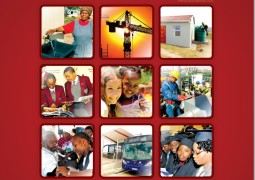
The National Assembly (NA) passed the Appropriation Bill during a debate on the Bill in the National Assembly yesterday. During the course of the debate, political parties represented in the NA voiced their favour and disfavour about its course, and the effect it would have on how the government dispenses its service delivery mandate.
The Chairperson of the Portfolio Committee on Appropriations, Mr Sifiso Buthelezi, expressed his gratitude to the committee for the work it did to ensure that the Bill is presented before Parliament to ensure that government undertakes its service delivery responsibilities as stipulated by the Constitution of the Republic of South Africa.
“I thank the members of our committee for their diligence and hard work in ensuring that we are able to table the report in this House within the time prescribed by the Money Bills Amendment Procedures and Related Matters Act,” said Mr Buthelezi.
He then gave a context on how the Bill came into being and what it sought to achieve. “The Bill proposes to appropriate from National Revenue Fund for the requirements of the state and to prescribe conditions for the spending of funds that have been withdrawn. For service delivery to continue, it is critical that the House today passes this Bill.”
But most of all, he pointed out, the Bill is one of the oversight instruments that the committee will utilise to hold the executive accountable. Apart from that, the Budget Vote process is a means of advancing participatory democracy. “It’s critical for the budget process to be demystified. The budget is about people’s lives, and our democracy is a participatory one. It cannot be, and it should not be seen to be something for the chosen few.”
Chief among the committee’s priorities is to ensure that there is value for the money in all that government does. “The contraction of our economy by 3.2% foregrounds its commitment, he added. “Economic growth is positively related to the revenue. If the economy does not perform, do not expect miracles from Sars (the South African Revenue Service). Although revenue shrinks, people’s needs do not shrink,” said Mr Buthelezi.
The bleak economic situation has forced the National Treasury to borrow 4.3% of our gross domestic product (GDP), he declared. “The deficit of R215 billion of GDP must be borrowed. The committee is both appreciative and sympathetic to National Treasury and the executive in the balancing act they have to execute under very trying economic conditions.”
Historically, he opined, much of the challenges that the current budget is faced with were not, in his words, a result of a “natural disaster”. “The backlog of services and inequalities was deliberately created to forever make the majority of South Africans spectators in the economic activity of their own country. This situation was man-made.”
A different scenario to our country’s economic growth woes was painted by Mr Denis Joseph, who suggested that “income to the state should guide our expenditure”. To him, the “New Dawn” is the “admission of guilt that the government has failed South Africans”.
He claimed that all the economic difficulties that the country is currently faced with took root during [former President] Zuma’s administration. “We started the stop the Zuma campaign in 2009. South Africans from all walks of life joined in until the African National Congress decided to recall Mr Zuma.”
According to him, the allocation of R17.6 billion to Eskom without and conditions, as he claimed, “is counter-productive. We call for the immediate unbundling process at Eskom.” But this should, in his view, not be limited to Eskom alone, but be extended to other state-owned enterprises. “State-owned entities that are embedded with corruption and maladministration are making South Africans poorer and must be restructured.”
Nothing would be spared to ensure that “budget priorities of our government are inclusive and achieve the objective of building a better South Africa for all our citizens”, he declared.
The issues of a bloated Cabinet resurfaced again. According to Ms Mmabatho Mokause of the Economic Freedom Fighters, the Cabinet is still bloated. “The money used to pay salaries can be used to deliver services. The irony is that we agree on these matters in our Budget Votes, but we consent to the passing of the Appropriation Bill without the smallest amendment to what we agreed on.”
She further pointed out that it took 10 years for Parliament to have the powers to amend the Money Bills, but it does little to utilise them to conduct effective oversight over the executive. “The Constitution allows Parliament to amend the Money Bills, yet we agree on much-needed changes but all our debates end up in a talk shop. We rubber stamp everything tabled by the Minister of Finance,” emphasised Ms Mokause.
Prince Mangosuthu Buthelezi said transparency should underpin government expenditure. This is, in his view, “essential in ensuring that South Africa knows exactly where its money will be spent”. What is of concern to him are “gross amounts of irregular, fruitless, wasteful and unauthorised expenditures incurred by departments year-on-year”.
Of major concern to him is that “there is no consequence management for those who are implicated in mismanagement of funds and corruption”, he claimed. In his view, that is where the problem lies. “If you find someone else’s hand in your pocket, you react immediately. But when it comes to someone taking from the state coffers, there is little or no reaction – and that is a major problem.”
Adding to the perception of a lack of consequence management, Mr Steven Swart of the African Christian Democratic Party, alluded to the fact that a lot has since come out at the Zondo Commission of Inquiry and other commissions, and those implicated in acts of corruption should be prosecuted. “With every day that passes, it becomes more difficult to reclaim lost billions of rands to corruption. Those implicated must be arrested and prosecution must take place. Stolen funds must be recovered.”
By Abel Mputing
24 July 2019

